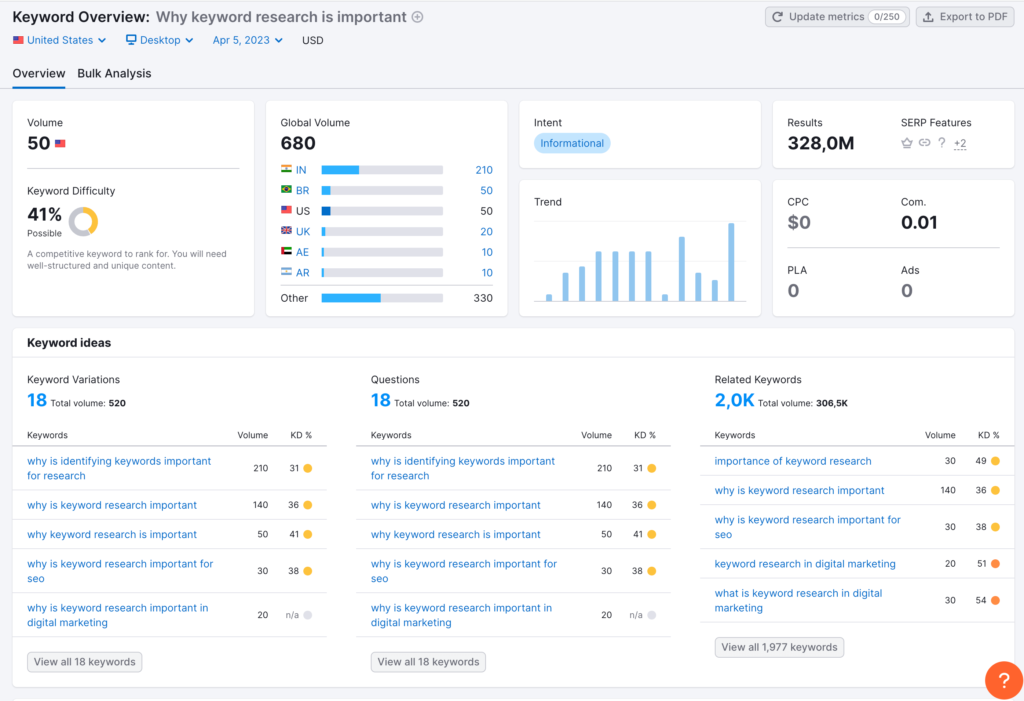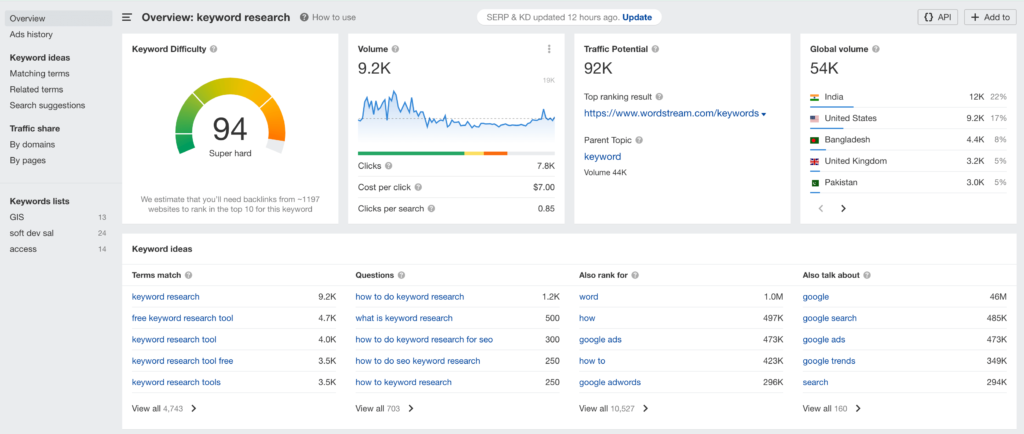
Imagine you have a brand new website that you’ve just launched. You believe that you have all benefits of SEO: high-quality content, stunning visuals, and everything else you think is necessary for a great website. But, after a few months, you notice that your website isn’t ranking well in search engines. What could be the problem?
Well, chances are you haven’t researched the keywords enough. But keyword research is the backbone of any successful SEO campaign, and it’s not something you should overlook.
In this article, we will explore what keyword research is and the importance of using keywords in SEO. We will also discuss the keyword research basics, how to conduct keyword research, and offer tips and best practices to help you get the most out of your keyword phrase research efforts.
By the end of this article, you will have a better understanding of how to conduct keyword research effectively and use it to improve your website’s search engine visibility. So, read on to learn more about why keyword research is vital for a successful SEO strategy.
What is keyword research in SEO?
Keywords are the foundation of SEO, and keyword research is the process of identifying the right keywords to target for your website or business. It involves researching and analyzing the search terms that people use to find information related to your industry, products, or services.
For example, let’s say you own a pet store that specializes in cat products. By conducting keyword research, you may discover that the search term “cat toys” has a high search volume and low competition. This indicates that people are actively searching for cat toys, but there aren’t many websites or businesses targeting this specific keyword. By targeting this keyword in your content and optimizing your website accordingly, you may be able to rank higher in search engine results and attract more potential customers.
Keyword research also involves understanding the intent behind a particular search query. For example, someone searching for “best cat food” may be looking for product reviews and recommendations, while someone searching for “cat food near me” is likely looking for a physical store location or online delivery service.
By understanding the intent behind different search queries, you can create SEO content that meets the needs of your target audience and provides value to them. This, in turn, can improve your website’s overall user experience and increase the likelihood of visitors converting into customers.
In summary, keyword research is an essential component of any SEO content strategy. By identifying the right focus keywords and understanding the intent behind search queries, you can optimize your website and content to attract more traffic, improve the user experience, and ultimately, drive more conversions and revenue for your business.

Why keyword research is important in SEO
Keyword research is a critical aspect of SEO because it helps you understand what people are searching for and how they search for it. By identifying the most relevant and profitable keywords for your website, you can optimize your content and increase your chances of ranking higher in search engines.
Here are some of the main reasons that explain the importance of keyword research in SEO:
Understand your audience
Keyword research helps you understand what your target audience is searching for online. By knowing the specific words and phrases they use to find products or services similar to yours, you can create content that aligns with their interests and needs.
For example, if you sell organic beauty products, you might find that your target audience is searching for terms like “natural skincare” or “vegan cosmetics”. By targeting these keywords in your content, you can attract more relevant traffic to your website.
Increase website traffic
Keyword research also can help you identify high-volume, low-competition keywords that you can target in your content. By optimizing your website for these keywords, you can rank higher in search results and drive more traffic to your website.
For example, if you’re a landscaping company in Denver, you might find that there’s a high search volume for the keyword “landscaping services Denver”, but relatively low competition. By targeting this keyword in your content, you can rank higher in search results and attract more potential customers to your website.
Improve the user experience
When you identify the specific search terms your target audience uses, you can develop the right SEO blogging and create content that answers their questions and addresses their pain points. This can help you build trust and authority with your audience, which can lead to increased engagement and conversions.
For example, if you’re a financial advisor, you might find that your target audience is searching for terms like “retirement planning tips” or “how to save for college”. By creating content that addresses these topics, you can provide value to your audience and establish yourself as an expert in your field.
Stay ahead of the competition
By monitoring the keywords your competitors are targeting, you can identify gaps in your own strategy and find new opportunities to rank higher in search results.
For example, if you’re a small online retailer, you might find that a larger competitor is targeting a specific keyword that you haven’t considered. By targeting that keyword in your own content, you can potentially rank higher than your competitor and attract more traffic to your website.
Optimize your content
By identifying the keywords and phrases your target audience is searching for, you can strategically include those terms in your content to improve your chances of ranking higher in search results. This can help you attract more traffic to your website and generate more leads and sales. By analyzing the keywords (your content gap), you can improve the ranking of your current content and create a new one for the queries found.
In summary, keyword research is a vital component of any successful SEO strategy. By investing time and resources into keyword research, you can improve your website’s visibility in search engine results pages, attract more high-quality traffic, and ultimately increase your chances of converting that traffic into sales.
At Mellow Promo, we understand the keyword research importance in SEO. That’s why we offer comprehensive keyword research services to help businesses like yours achieve their SEO goals. Contact us today to learn more about how we can help you optimize your website for search engines and drive more traffic and revenue to your business.
Keyword research basics
Keyword research is not just about finding keywords to include in your content. It’s about understanding your audience’s search behavior and finding the most relevant and profitable keywords to target. Here are some of the key components and elements to consider when conducting keyword research:
Keyword Volume (Global and Local)
This refers to the number of searches for a specific keyword over a month. Global search volume gives you an idea of the keyword’s popularity worldwide, while local search volume provides insights into how popular the keyword is in a specific location. It’s important to target keywords with high search volume to attract more traffic to your website.
Let’s say you’re a local flower shop in New York City and you want to target the keyword “flower delivery.” By using Google Keyword Planner, you find out that the global search volume for this keyword is about 823,000 and the local search volume is about 22,200. This information tells you that the keyword is popular worldwide and also in your specific location, making it a great target for your business.
Keyword Difficulty (Competition)
Keyword difficulty refers to how hard it is to rank for a particular keyword in search engine results pages (SERPs). A keyword with high difficulty means there are many other websites competing for the same keyword. It’s important to target keywords with low to medium difficulty to increase your chances of ranking higher in search results.
For example, if you’re running an e-commerce store selling shoes and you want to rank for the keyword “running shoes,” you’ll find that it’s a highly competitive keyword, so you might want to target less competitive long-tail keywords like “best running shoes for women” or “affordable running shoes for beginners.”
Search Intent
This refers to the reason why someone is searching for a specific keyword. There are three main types of search intent:
- 1. Informational: the user is looking for information about a particular topic or subject. For example, “how to lose weight fast” or “best places to travel in Europe.”
- 2. Navigational: the user is looking for a specific website or webpage. For example, “Facebook login page” or “Amazon Prime login.”
- 3. Transactional: the user is looking to make a purchase or take a specific action. For example, “buy Nike shoes online” or “book a hotel in New York.”
By identifying the search intent of your target audience, you can tailor your content and keywords to match their needs and interests. This can lead to higher engagement, better conversion rates, and improved search engine rankings.
Relevance
Relevance refers to how relevant a keyword is to your website and the content you’re creating. It’s important to target keywords that are relevant to your website’s niche and the topics you cover to attract the right audience.
For example, if you’re running a tech blog and you’re looking for keyword ideas, you might want to target keywords like “best laptops for gaming” or “top smartphones of 2023” as these keywords are relevant to your niche. Also read our article on how to do keyword mapping for SEO.
By considering these components and elements when conducting keyword research, you can identify the most relevant and profitable keywords to target in your content. This will help you improve your website’s visibility, attract more traffic, and improve user experience.

How to do SEO keyword research
Keyword research is a crucial step in any SEO strategy, and there are several tools and steps you can use to conduct effective research. Here are the main steps to follow when doing search engine keyword research:
- 1. Identify your audience and niche: Understanding your audience and the niche you’re targeting is the first step to conducting effective keyword research. This will help you identify the keywords that are relevant to your audience and the topics they’re interested in. One tool you can use to gain insights into your audience’s search behavior is Google Search Console.
- 2. Brainstorm keyword ideas: Brainstorm a list of potential keywords that are relevant to your audience and niche. Use tools like Google Trends, and AnswerThePublic to find keyword ideas and questions people are asking about your niche.
- 3. Use keyword research tools: There are several tools you can use to analyze keyword data and find new keyword ideas, such as Google Keyword Planner and SEMrush. These tools provide data on search volume, competition, and keyword difficulty, which will help you identify the most profitable keywords to target.
- 4. Analyze your competitors: Analyzing your competitors’ keyword strategy can provide insights into the keywords they’re targeting and help you identify gaps in their strategy that you can capitalize on. Use tools like Ahrefs and Moz to analyze your competitors’ keywords and their search engine rankings.
- 5. Refine your list of keywords: After conducting research and analyzing your competitors, refine your list of all types of keywords to focus on those with the highest search volume, lowest competition, and highest relevance to your audience and niche.
By following these keyword research steps and using the right tools, you can conduct effective keyword research that will help you improve your website’s visibility, attract more traffic, and improve user experience.
SEO keyword research tips and best practices
While following the main steps for SEO keyword research is important, there are also several tips and best practices that can help you conduct more effective research and achieve better results. Here are some of the top tips and best practices for search engine optimization keyword research:
Conduct competitor keyword research
Analyzing the keywords that your competitors are targeting can help you identify gaps in their strategy and find opportunities for your own keyword targeting. Look for keywords that your competitors are ranking well for, but that you’re not targeting, and consider adding those to your keyword list.
Do long-tail keyword research
Long-tail keywords are longer and more specific keyword phrases that target a niche audience. They typically have lower search volume but higher conversion rates, as they target users who are further along in the buying process. Long-tail keywords help you target a specific audience and provide more context to search engines about the content you’re creating.
For example, if you’re running a recipe blog and you want to rank for the keyword “pasta,” you might find that it’s too broad and competitive, so you might want to target long-tail keywords like “quick and easy pasta recipes” or “vegetarian pasta dishes.”
Use tools for keyword research like Google Keyword Planner and SEMrush to find long-tail keyword ideas and incorporate them into your keyword strategy.
Use Google’s Related Searches
Google’s related searches feature is a great way to find new keywords that are related to your main keyword. These related searches are shown at the bottom of the search results page, and they can give you ideas for new keywords to target.
Consider seasonality
Some keywords may have higher search volume during certain times of the year, such as holidays or seasonal events. Make sure to consider seasonality when doing keyword research, and target keywords that are relevant to the time of year.
Use keyword synonyms and variations
Using synonyms and variations of your main keyword can help you target a wider range of users and improve your chances of ranking higher in search engines. Use a thesaurus or keyword research tool to find synonyms and variations of your main keyword. For example, if you’re targeting the keyword “dog food,” you could also use variations like “pet food,” “canine nutrition,” or “dog chow.”
By incorporating these tips and best practices into your SEO keyword research strategy, you can improve the effectiveness of your keyword targeting and attract more high-quality traffic to your website. And following the guidelines outlined in the official Google SEO guide can help ensure that your website’s content is optimized for search engines and user experience alike.
The importance of keyword research: Conclusions
Keyword research is a crucial component of any successful SEO strategy. By conducting thorough keyword research, you can identify the terms and phrases that your target audience is searching for and tailor your content to meet their needs. This, in turn, can improve your website’s visibility in search engine results pages, attract more high-quality traffic, and ultimately lead to more conversions and sales.
At Mellow Promo, we understand the importance of effective keyword research for SEO. Our team of experienced SEO professionals uses the latest tools and techniques to conduct thorough keyword research and develop comprehensive keyword strategies for our clients. We analyze search volume, competition, and search intent to identify the best keywords for your business, and then incorporate them into your website and content to improve your search rankings and drive more traffic.
If you’re looking to improve your website’s SEO and attract more high-quality traffic, consider partnering with Mellow Promo SEO company for your keyword research needs. Contact us today to learn more about our services and how we can help you achieve your SEO goals.





